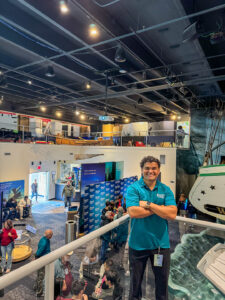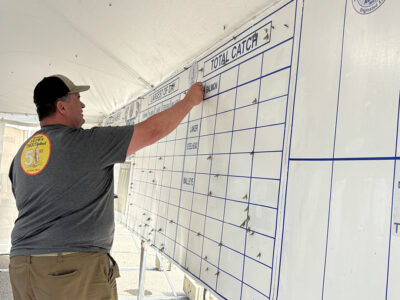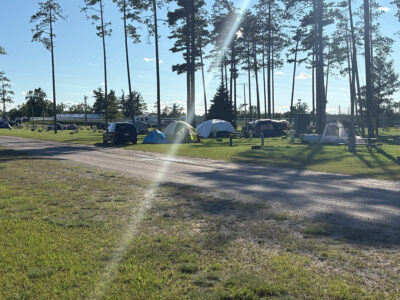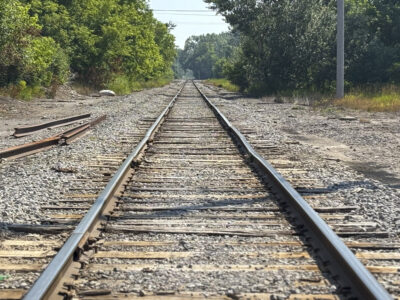A day with Alpena County’s 911 dispatchers

News Photo by Julie Riddle Framed by computer monitors, dispatcher Ray Wekwert fields a call at Alpena County Central Dispatch on Monday.
ALPENA — In a dim room at the Alpena County Central Dispatch center, 26 computer monitors glow with information.
An alert sounds. A woman pokes a computer screen.
“Alpena County 911. Where is your emergency?” the dispatcher says, eyes bouncing between the screens, fingers dancing on a keyboard.
It could be anything.
A woman is having a seizure.

News Photo by Julie Riddle Surrounded by a bank of screens, dispatcher Ray Wekwert helps a caller at Alpena County Central Dispatch on Monday.
Cars have collided at an intersection.
Sparks have ignited dry backyard grass.
Someone has fallen, and they can’t get up.
“We do a lot in here,” dispatcher Pam Susan said. “We’re the first first responder.”
All hours of the day, all days of the week, dispatchers at Alpena County Central Dispatch are at the ready, headsets on, fingers poised, waiting to be the calm voice on the other end of the phone line when someone needs help.
Susan and her longtime partner, Roy Wekwert, started a recent Monday shift with chaos — back-to-back calls about a boat sinking, a car-vs.-deer mashup, and someone trying to steal pills from the hospital.
“I don’t like it when I come in at 6 a.m. and all hell breaks loose,” Susan said.
The nine dispatchers who answer more than 25,000 911 calls each year have heard it all. Motorists trapped by cows in the road. Baby raccoons on the loose.
Reports of sasquatch sightings.
On the wall, a dry erase board contains the quote of the day from a caller: “There’s a house in the ditch.”
***
An alert sounds. Wekwert pokes a screen. The call disconnects.
“Pocket dial,” Susan predicts.
A return call from Wekwert confirms the mistake. Happens all the time, Wekwert tells the caller.
Often used as toys for small children, old, disconnected cell phones are the bane of a dispatcher’s existence, Susan said. Even without service, phones — including landlines — will call 911 if even just the 9 and the 1 are pushed. Often, dispatchers answer a call and hear a toddler chewing.
Next time, stay on the line, Wekwert tells the pocket-dialer, because he’s going to have to call back anyway, just to make sure everyone’s safe.
Another call rings in. A woman says her husband needs medical help. Wekwert launches into a list of questions, populated on his computer screen based on the information he punches in.
In the background of the call, someone is swearing, telling the dispatcher to quit asking questions and just send an ambulance.
Anger from callers is common, Susan said. They don’t like answering what feel like invasive medical questions during their moment of panic.
All the information callers share goes into a computer and, from there, directly and instantly to the phone of the professional who will show up at the caller’s doorstep. The more callers can tell dispatchers, the better prepared their rescuers will be, she explained.
While Wekwert gathers information from a caller — Is she breathing? Has this happened before? Is she pale? — Susan, the information appearing on her bank of screens as well, calls for an ambulance, her voice level.
Dispatchers, Susan said, have to be the calm in the storm. Callers sometimes get mad because she isn’t upset along with them, but it’s her job to keep an even keel, regardless of how she feels inside.
First responders and police have enough stress, Wekwert said. An excitable dispatcher only ramps up the anxiety, putting everyone on edge and possibly putting responders in danger.
Sometimes, Susan added, when dispatchers know time is of the essence, they’ll add just a touch of urgency to their pages for help.
“By the tone of our voice, we’re very subtly saying, ‘Move your ass quickly,'” she said.
***
Mug in hand, Wekwert leaves to get coffee from the break room across the hall.
A ring sounds, and he runs back in.
Susan picks up the call, and he heads back out for his coffee.
Another ring brings him running once again, mug still empty.
Hours may pass between calls, time used to catch up on paperwork or crossword puzzles or to eat a slice of strawberry pie.
Other times, the calls come fast and furious.
The call center, where two dispatchers are always on duty, receives about 69 calls for help a day, not including pocket dials or non-essential questions that don’t require an emergency response.
“Every call, we have no idea if it’s nothing or everything,” Wekwert said.
The burst of adrenaline every time a call comes in feels like little firecrackers all day long, leaving dispatchers drained by the end of their 12-hour shift.
***
Intermingled with the calls for help and crash reports and pocket dials are the calls to ask what time the parade starts or to demand a police escort because of post-fireworks traffic congestion.
“Dispatch fixes everything,” Susan said, with a slight roll of the eyes.
On the nine monitors in front of her, she zooms among bits of information — looking up wind speed on the weather channel to help firefighters battling a blaze, perhaps, or checking on outstanding warrants for a police officer at a traffic stop.
A giant, digital map, responding the instant a call comes in, zooms to the specific location from which a call originates. If a caller isn’t sure where they are, their cell phone pings a location that lets the dispatchers send help.
Maybe there will be a structure fire today, Wekwert suggests, and Susan groans.
People think dispatchers make one call to get help and their job is done, Susan said. Structure fires are, she explained, a prime example of how incredibly untrue that is.
A large fire could require multiple alerts given to multiple fire departments and police.
Dispatchers may need to call utility companies to shut off gas and electric, the water department to up hydrant pressure, the road commission to help clear winter-blocked roads.
They’re the ones who call a tow truck to rescue an emergency vehicle that’s gotten stuck on an unpaved back road.
Even a relatively simple assist for someone with a non-life-threatening medical need requires multiple pages to responders over the call center’s radio system, which is old enough that repair service is no longer available.
If replacement parts are needed, they have to be found on eBay.
***
Susan talks a man through helping his sick wife. She doesn’t hang up until first responders are tapping on the man’s front door.
“Stay on the line, and I’ll tell you exactly what to do,” Susan tells the man.
Dispatchers stay on the phone as long as they’re needed.
Susan and Wekwert said they’ve lost track of how many times they’ve run out of breath as they counted along with a caller, talking them through performing CPR on a loved one until help arrived.
Sometimes, with a caller from a rural area, that meant 20 minutes of, “One, two, three, four, you’re doing good, two, three, four,” at the heart-thumping pace of the Bee Gees’ “Staying Alive.”
Some calls are exhausting.
Others are heartbreaking.
Susan remembers talking to a lost, underdressed man for 45 minutes as he wandered through woods in winter after his car crashed — pacing the room as she talked into her headset, prodding him over the phone to stay awake, hearing him trip and fall, not knowing if he would be found in time.
“I know beyond a shadow of a doubt I saved his life,” Susan reflected. “Yeah, that felt good.”
She remembers another time listening to an injured child scream until first responders arrived, and then, when she finished the call, sitting on the back steps, shedding tears of her own.
She remembers answering the call about the death of her daughter’s friend.
Wekwert still winces at the memory of one woman he talked to, trying desperately through the phone to help her save herself from drowning.
When she didn’t make it, it was his job to honor her last request to tell her sons she loved them.
You survive the sadness because, the dispatcher said, you go home at night at least knowing you did what you could.
You were there for them.
You answered their call.
***
At 6 p.m., two other dispatchers arrive. They’re the overnight crew, the ones who stay awake all night.
They’re fresh-faced and alert as they slip on their headsets and adjust their monitors.
As they get settled, a phone rings.
Julie Riddle can be reached at 989-358-5693, jriddle@thealpenanews.com or on Twitter @jriddleX.
- News Photo by Julie Riddle Framed by computer monitors, dispatcher Ray Wekwert fields a call at Alpena County Central Dispatch on Monday.
- News Photo by Julie Riddle Surrounded by a bank of screens, dispatcher Ray Wekwert helps a caller at Alpena County Central Dispatch on Monday.







